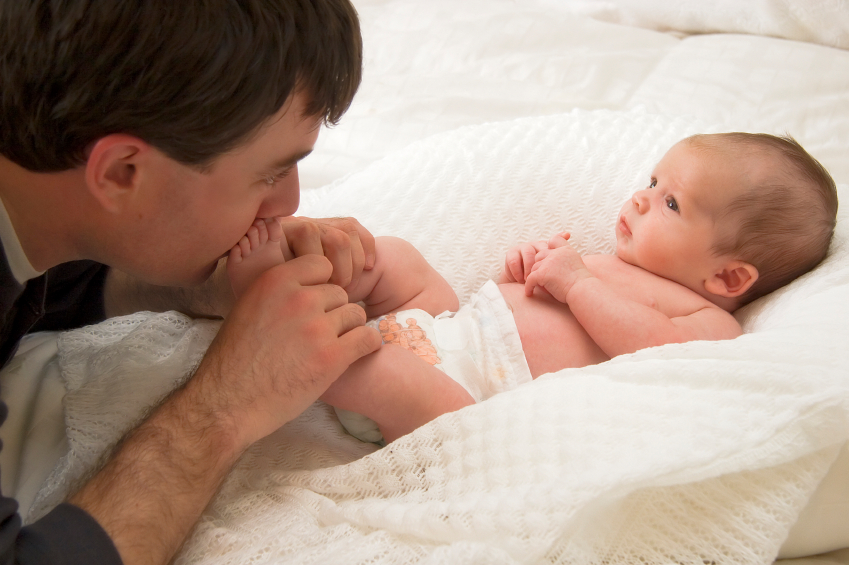 In the United States, only 1 in 100 dads take more than four weeks off from work following a baby’s birth. For comparison, about 50% of employed new mothers take the same time off to care for a new baby. In fact, working moms step out of work for an average of 10 weeks to care for a newborn.
In the United States, only 1 in 100 dads take more than four weeks off from work following a baby’s birth. For comparison, about 50% of employed new mothers take the same time off to care for a new baby. In fact, working moms step out of work for an average of 10 weeks to care for a newborn.
There are, of course, many reasons more moms take family leave vs. dads. For starters, the physical components of giving birth, recuperating, and breast-feeding. I remember the day my first baby turned six weeks old. That Monday felt like the absolute earliest, physically, that my postpartum body could have managed work in addition to nighttime feedings and the exhaustion of early motherhood. And it was another six weeks before I actually managed to leave the house and get back to my desk.
Societal expectations that mom, not dad, will be an infant’s primary caregiver, also weigh heavily on many couples. Some moms want to be their baby’s fulltime commandant, protector and literal nurse. Sometimes the pressure to do so – plus the general chaos of early parenthood — confuses what a new mom, and dad, really want. My husband had not held a baby until he held ours. I had two younger siblings and had been babysitting since I was 11. Parenthood, predictably, came more easily to me — and rightly or wrongly, I felt far more qualified for the job. So, faced with the terrifying, seemingly impossible, task of keeping a helpless newborn alive, we both went with me as primary caregiver.
And then there’s financial security — someone needs to pay for all those diapers, right?
Men often feel that fatherhood puts pressure on them to work more, not less. According to Joan Williams, director of the Center for WorkLife Law at the University of California Hastings College of the Law, “Until the 1970s, being a good father meant leaving home to be a good breadwinner.” But men’s roles, like women’s, are changing. “Now, many younger men, though not all, see being a good father as requiring involvement in children’s daily lives and activities,” says Williams.
In California, the vanguard for so much of American social change, acceptance of dads as caregivers is growing. In 2004, California started offering dads six weeks of paid leave to care for a child or sick relative. The government program pays dads out of small deductions from employee paychecks. California dads now account for one-third of all paid leaves. It has become acceptable — perhaps even de rigeur in some circles– for dads to take paternity leave in California. One reason fathers in California appear to be embracing the paid-leave program, work-life guru Williams explains, is that it allows them to “live up to this new ideal as day-to-day nurturer and keep their old role as providers.”
Rutgers University psychologist Laurie Rudman found that historically, men who request family leave are more likely to be penalized and viewed as poor contributors at their workplace than women. She believes this is part of why so few fathers take time off to care for their babies in the rest of the country. Rudman found that men in California whose private employers had offered paid paternity leave before the law was passed, interestingly, were significantly more likely to take it after the law was in place.
“There’s something about a state saying we place this economic value on your time off that matters,” she says. The law signals cultural acceptance of men as caregivers. And, Rudman explains, the fact that the paternity leave is paid lessens the social stigma. “The money butches it up,” Rudman believes.
Whatever the reasons that California dads are staying home more, it’s good news in my view. First off, dads deserve to stay home too. As much as I hated the loaded question from friends, relatives and colleagues– “So, are you coming back?” — it is totally unfair that my male colleagues were rarely asked the same question. It was as if our society didn’t even give men the choice of whether to stay home with a baby.
But the benefits expand beyond the immediate nuclear family of mom, dad and offspring. When men get into the parenthood gig, the practical knowledge they gain ripples out into society. A male teacher who has been his children’s sole caregiver will invariably have a few more tricks up his sleeve to motivate and teach kids of all ages. A politician who has stayed home with sick children may have greater understanding of the need for quality healthcare and emergency childcare. An entrepreneur, doctor or safety engineer who better understands how vulnerable an infant is may invent a new vaccine, a safer stroller, a car with more child-friendly features.
And although it pains me to admit this, more at-home dads add gravitas to early parenting, hopefully obliterating the dreaded, utterly inaccurate phrase “just a stay at home mom.”
Over 80 countries worldwide offer paid family leave. The U.S. is not one of them. Let’s hope the trend in California continues nationwide and that more moms and dads have the option of staying home to bond with, care for, and raise, our littlest citizens.





